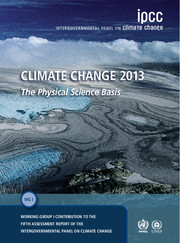 Climate Change 2013 – The Physical Science Basis
Climate Change 2013 – The Physical Science Basis Published online by Cambridge University Press: 05 June 2014
The Working Group I contribution to the Fifth Assessment Report of the Intergovernmental Panel on Climate Change (IPCC) provides a comprehensive assessment of the physical science basis of climate change. It builds upon the Working Group I contribution to the IPCC's Fourth Assessment Report in 2007 and incorporates subsequent new findings from the Special Report on Managing the Risks of Extreme Events and Disasters to Advance Climate Change Adaptation, as well as from research published in the extensive scientific and technical literature. The assessment considers new evidence of past, present and projected future climate change based on many independent scientific analyses from observations of the climate system, paleoclimate archives, theoretical studies of climate processes and simulations using climate models.
Scope of the Report
During the process of scoping and approving the outline of its Fifth Assessment Report, the IPCC focussed on those aspects of the current understanding of the science of climate change that were judged to be most relevant to policymakers.
In this report, Working Group I has extended coverage of future climate change compared to earlier reports by assessing near-term projections and predictability as well as long-term projections and irreversibility in two separate chapters. Following the decisions made by the Panel during the scoping and outline approval, a set of new scenarios, the Representative Concentration Pathways, are used across all three Working Groups for projections of climate change over the 21st century.
To save this book to your Kindle, first ensure [email protected] is added to your Approved Personal Document E-mail List under your Personal Document Settings on the Manage Your Content and Devices page of your Amazon account. Then enter the ‘name’ part of your Kindle email address below. Find out more about saving to your Kindle.
Note you can select to save to either the @free.kindle.com or @kindle.com variations. ‘@free.kindle.com’ emails are free but can only be saved to your device when it is connected to wi-fi. ‘@kindle.com’ emails can be delivered even when you are not connected to wi-fi, but note that service fees apply.
Find out more about the Kindle Personal Document Service.
To save content items to your account, please confirm that you agree to abide by our usage policies. If this is the first time you use this feature, you will be asked to authorise Cambridge Core to connect with your account. Find out more about saving content to Dropbox.
To save content items to your account, please confirm that you agree to abide by our usage policies. If this is the first time you use this feature, you will be asked to authorise Cambridge Core to connect with your account. Find out more about saving content to Google Drive.